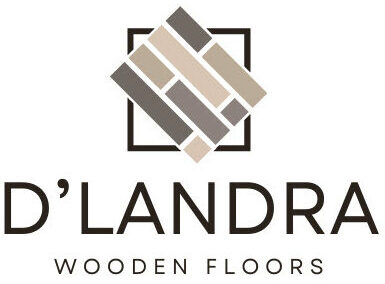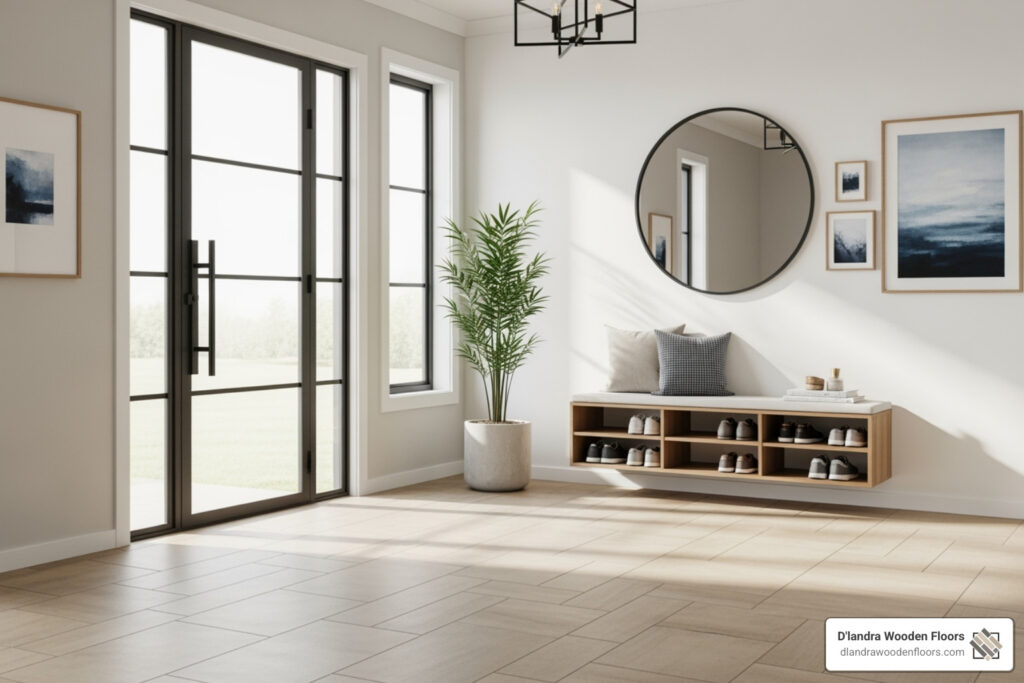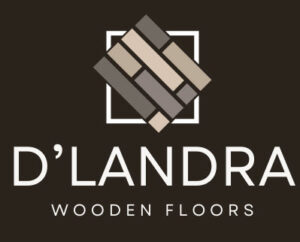Table of Contents
ToggleWhy Your Entryway Deserves Commercial-Grade Protection
Durable entryway flooring is your home’s first line of defense against daily wear, tracked-in moisture, and constant foot traffic. The best options combine toughness with style:
- Porcelain tile – Hardest and most water-resistant; ideal for heavy traffic
- Luxury vinyl plank (LVP) – Waterproof, scratch-resistant, softer underfoot
- Engineered hardwood – Moisture-resistant with real wood beauty; can be refinished
- Natural stone – Timeless elegance with decades of durability (requires sealing)
Your entryway is the hardest-working space in your home. It’s where muddy shoes meet beautiful floors, pets shake off rain, and guests form their first impression. Unlike a formal dining room, your entryway sees action every single day.
That’s why choosing the right floor for this high-traffic zone means thinking beyond aesthetics. You need a material that can handle moisture from Florida’s afternoon storms, resist scratches from sandy shoes, and still look inviting years from now. Today’s flooring technology offers options that don’t force you to choose between durability and style.
I’m Alissa Landra, founder of D’Landra Wooden Floors, and I’ve spent over a decade helping South Florida homeowners select durable entryway flooring that stands up to our unique climate challenges while creating stunning first impressions. Let me walk you through the options that work in real-world conditions.
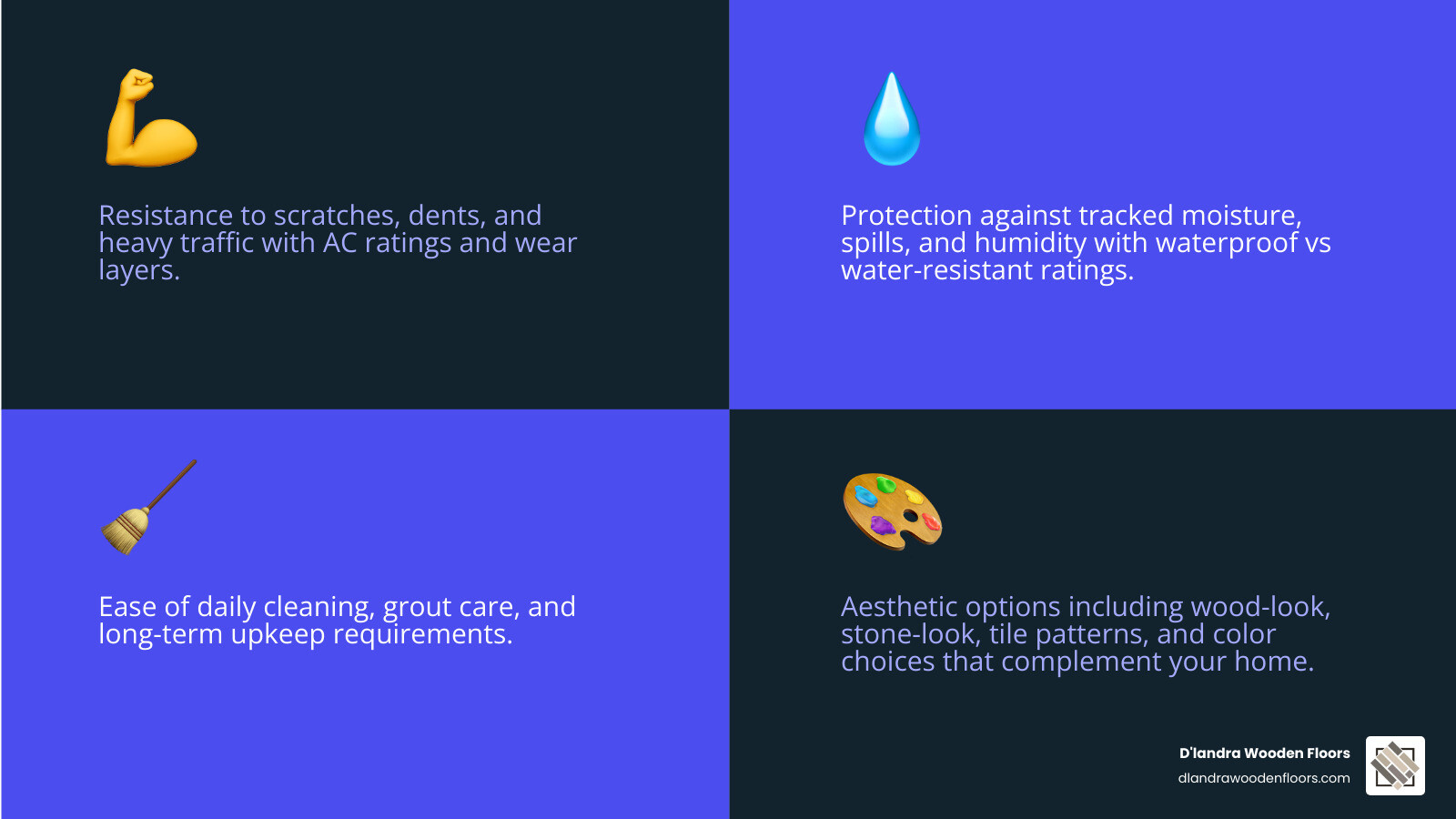
Simple durable entryway flooring word guide:
The Gauntlet: Why Your Entryway Floor Faces the Toughest Challenges
On any given day, your entryway floor endures cleats for soccer practice, dropped backpacks, pets shaking off rain, and water tracked in from a typical South Florida afternoon storm. Your entryway isn’t just another room; it’s ground zero for everything the outside world throws at your home.
Every person who enters your home crosses this threshold, creating constant friction and impact. From scuffing shoes to pet claws, this relentless activity demands flooring that resists scratches and wear patterns.
In South Florida, moisture is a major factor. Wet shoes, dripping umbrellas, and high humidity mean your entryway floor must offer serious water protection to prevent warping, staining, or mold growth. Truly durable entryway flooring must be ready for water.
Water isn’t the only issue. Fine beach sand, garden soil, and grit from parking lots collect in your entryway. These tiny particles act like sandpaper underfoot, slowly abrading the floor’s surface.
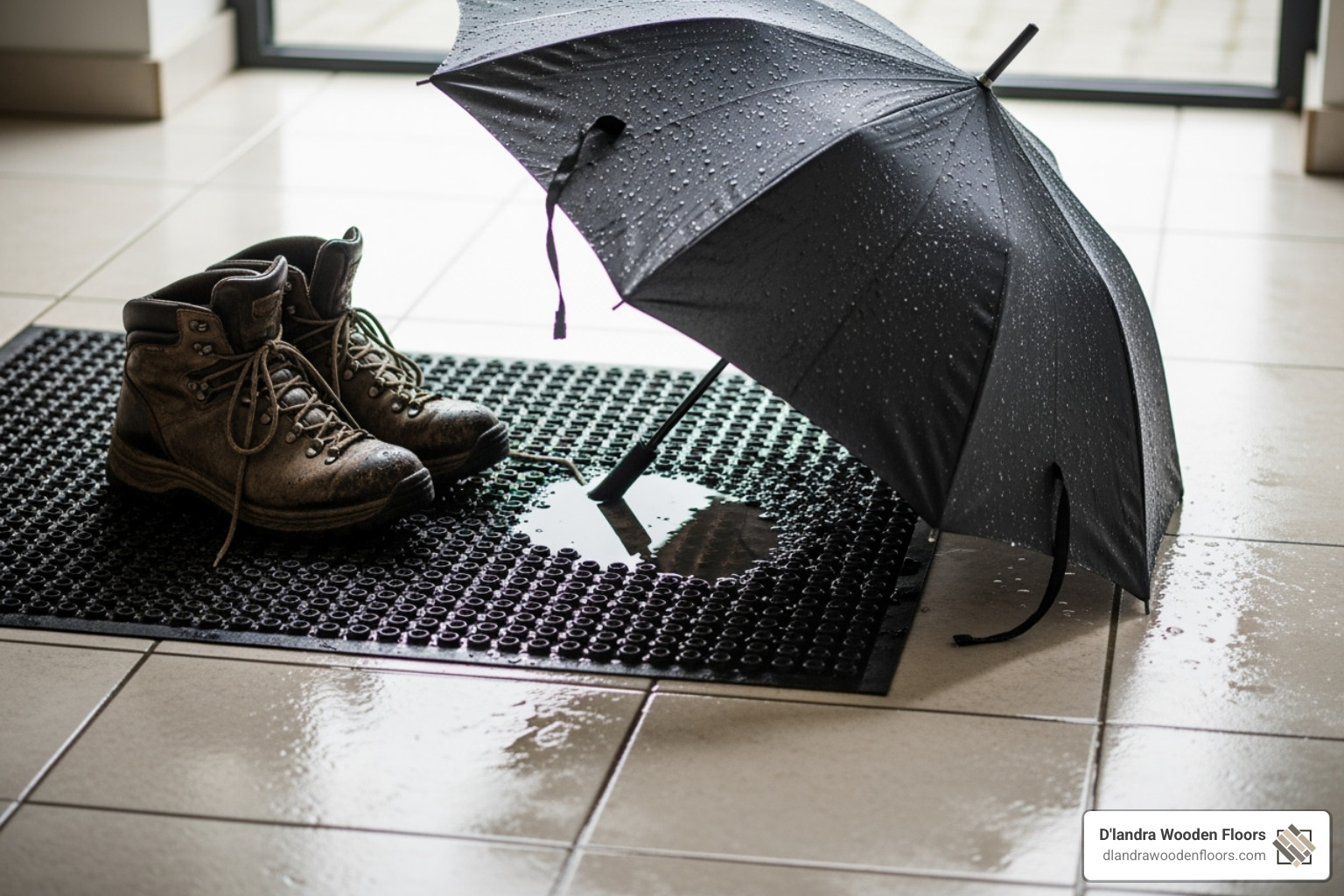
Direct hits from dropped keys, high heels, and sports equipment can cause scratches and scuffs. A durable entryway floor needs to withstand this real-world punishment, not just look good in a showroom.
Even temperature shifts matter. The difference between your air-conditioned interior and the hot Florida outdoors can cause some materials—particularly solid hardwood—to expand and contract, leading to gaps or buckling over time.
Key Factors to Consider
When we discuss durable entryway flooring with homeowners, we focus on five critical factors:
Durability ratings tell you what a material can withstand. For vinyl, we look at the wear layer thickness; for tile, it’s density and hardness ratings. These numbers indicate real resistance to dents and scratches.
Water and stain resistance is non-negotiable for entryways in Florida. Flooring should be either waterproof or highly water-resistant. Natural stone and certain tiles require proper sealing to prevent moisture from seeping in.
Ease of cleaning saves you time and headaches. Low-maintenance flooring that handles quick sweeps and damp mopping is ideal. Materials with fewer or darker grout lines also help hide dirt.
Aesthetic appeal matters because your entryway sets the tone for your home. Modern durable flooring beautifully mimics natural wood and stone, so you don’t have to sacrifice style for toughness.
Budget and long-term value means looking beyond the price tag. Durable materials may cost more upfront but can last for decades, offering better long-term value and increasing your home’s resale value.
Top Contenders: The Best Materials for Durable Entryway Flooring
When choosing durable entryway flooring for your South Florida home, you don’t have to sacrifice beauty for toughness. Here are the top contenders that stand up to real-world conditions.
| Material | Durability | Water Resistance | Maintenance | Style Options |
|---|---|---|---|---|
| Porcelain Tile | Outstanding—extremely hard and dense | Excellent when properly sealed | Minimal upkeep, but grout needs attention | Endless variety: stone-look, wood-look, geometric patterns |
| Luxury Vinyl (LVP/LVT) | Excellent—tough wear layer resists scratches | Superior (often 100% waterproof) | Very easy—just sweep and damp mop | Highly versatile with realistic wood and stone designs |
| Engineered Hardwood | Good to Excellent (varies by species and finish) | Good—moisture-resistant core | Moderate—needs careful cleaning, avoid standing water | Classic warmth of real wood in various species and finishes |
Tile (Porcelain, Ceramic, & Natural Stone): The Classic Champion
Tile, particularly porcelain, consistently earns its spot at the top of the list for durable entryway flooring.
Porcelain takes the crown over ceramic for entryway durability. It is denser, harder, and more resistant to moisture, making it a smarter long-term investment. Its versatility is also a major plus, as modern porcelain can convincingly mimic natural stone, concrete, or even wood planks.
Natural stone brings timeless elegance. Materials like slate, travertine, and granite have graced entryways for generations. Slate offers a rugged, naturally slip-resistant surface perfect for wet feet, while travertine brings a warm, Mediterranean feel. However, these materials are porous and require proper sealing to resist staining and moisture damage.
The grout conversation is crucial. Grout lines trap dirt, so our advice is to choose larger format tiles to minimize them. When you do have grout, darker colors hide dirt better, and sealing it is non-negotiable to prevent staining.
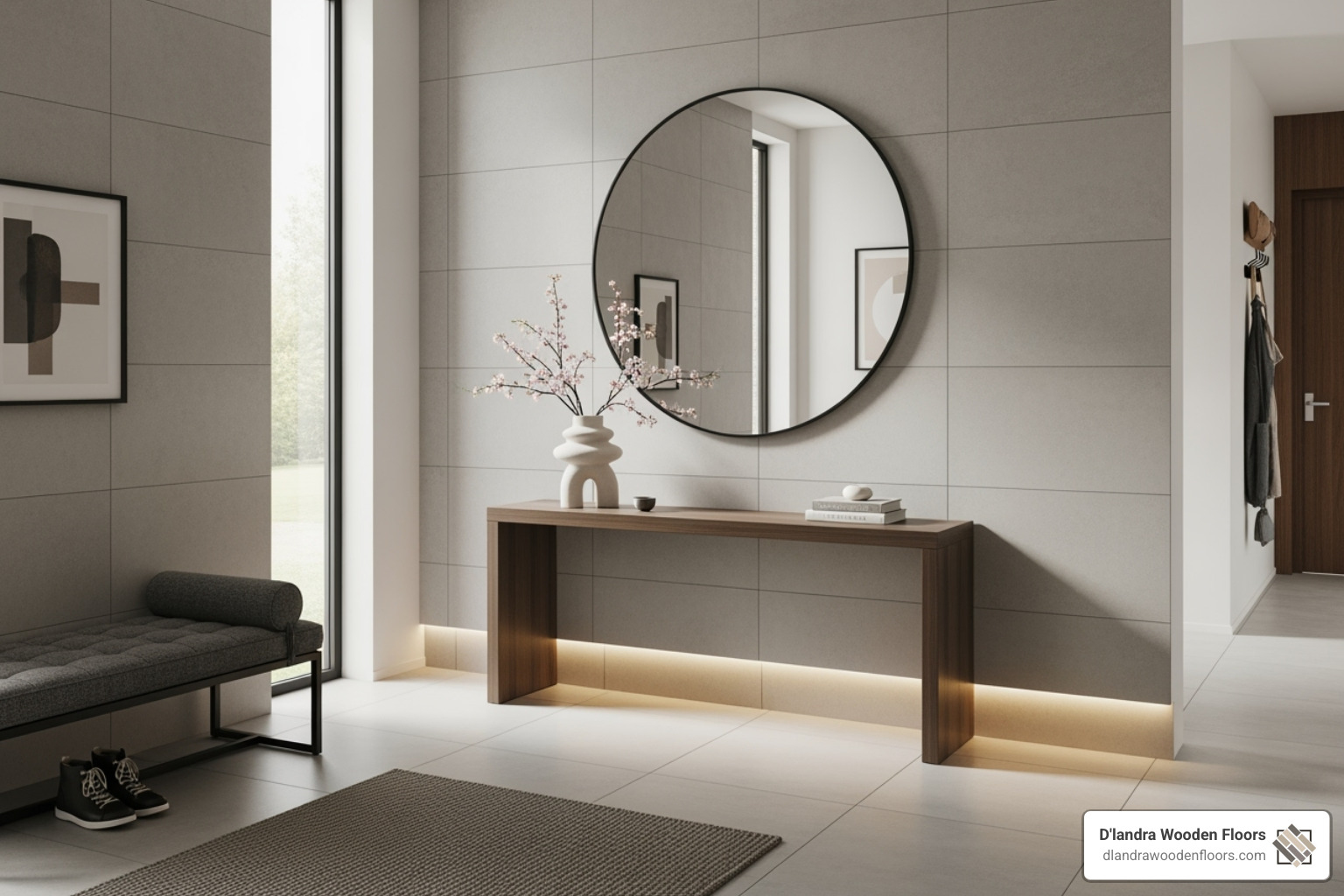
This Capitol Hill townhouse showcases a stunning patterned tile floor that proves durability and style aren’t mutually exclusive.
Luxury Vinyl Flooring (LVP/LVT): The Versatile All-Rounder
Luxury vinyl plank (LVP) and luxury vinyl tile (LVT) have completely changed the game for durable entryway flooring.
Waterproof construction is its headline feature. Many luxury vinyl products are 100% waterproof, meaning they won’t be damaged by tracked-in pool water, rain, or spills. The scratch-resistant wear layer on quality LVP is also genuinely impressive, engineered to handle high heels, pet claws, and dragged luggage.
Modern luxury vinyl also looks remarkably realistic. Advanced technology allows for textures that perfectly align with the printed wood grain pattern, creating visual depth and authenticity. Unlike the cold, hard surface of tile, luxury vinyl has a slight give, making it more comfortable underfoot. Many products also include sound-dampening backing.
Installation is often simpler with click-lock systems that allow planks to snap together. This floating installation method works over most existing subfloors, which can reduce installation time and cost.
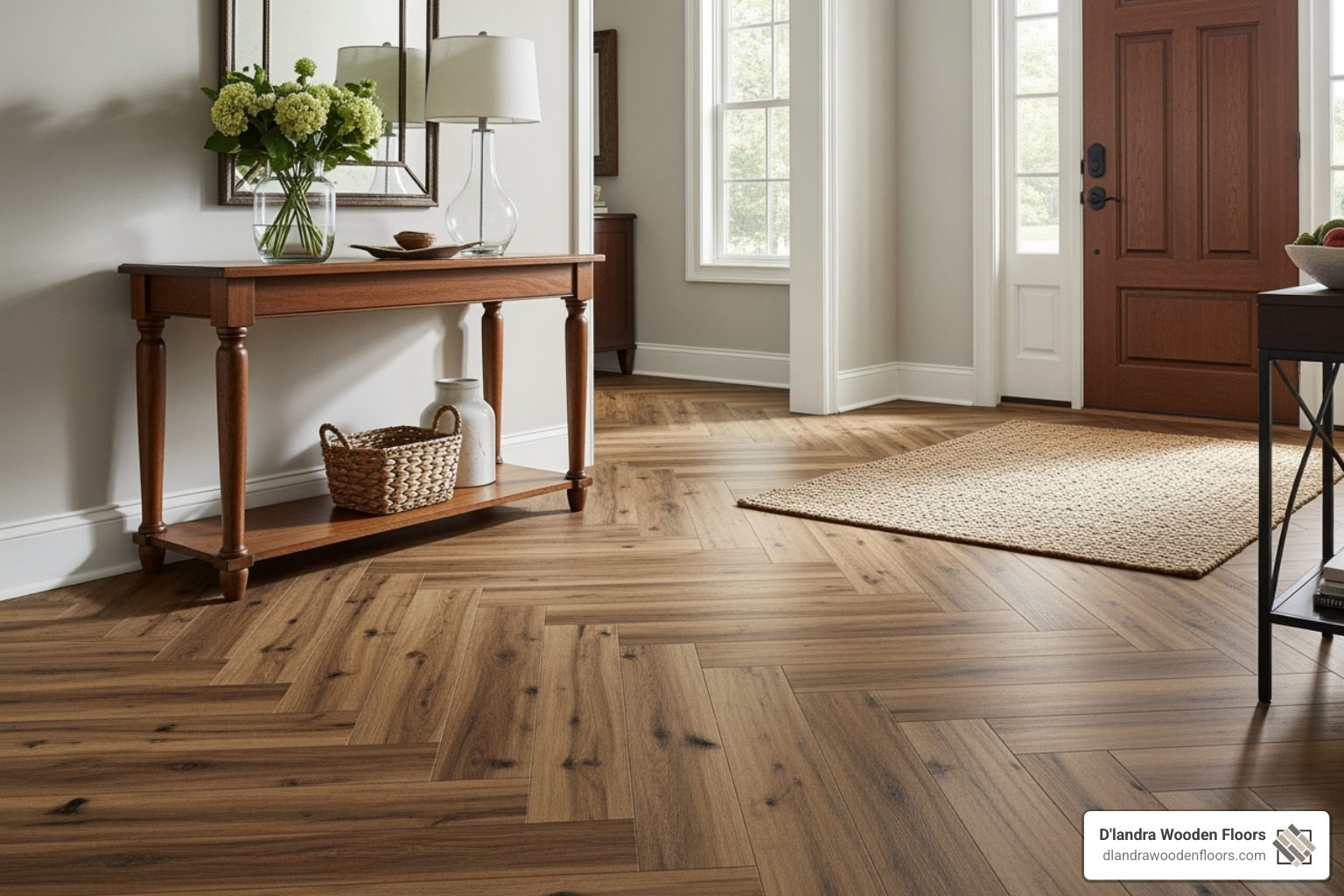
Engineered Hardwood: The Warm and Resilient Choice
For those who love real wood but worry about moisture, engineered hardwood offers the perfect compromise. It delivers authentic beauty with significantly better performance in challenging conditions.
Its moisture-resistant core, made of multiple layers of plywood or high-density fiberboard, provides maximum stability. This construction dramatically reduces the warping and cupping that can plague solid hardwood in humid climates like South Florida.
The top layer is a real wood veneer—oak, maple, hickory—so you get the natural grain and character that only real wood can provide. This dimensional stability makes it our go-to recommendation for durable entryway flooring when clients have their hearts set on real wood.
Refinishing potential adds serious long-term value. Unlike LVP, quality engineered hardwood with a thicker wear layer can be sanded and refinished multiple times, potentially lasting 90 years or more. This means you can restore it to like-new condition rather than replacing it entirely.
A herringbone wood floor can create an elegant entryway, adding visual interest while the engineered construction ensures it stands up to daily traffic.
Beyond the Material: Design, Protection, and Long-Term Value
Selecting the perfect durable entryway flooring material is just the beginning. Thoughtful design, smart maintenance, and an understanding of long-term value will create an entryway that is both stunning and built to last.
Creative Design Ideas for a Lasting First Impression
Your entryway is your home’s handshake. Here are a few ways to make it memorable.
- Patterns: A herringbone layout transforms ordinary planks or tiles into something special, creating movement and sophistication. A herringbone wood floor can create an elegant entryway.
- Geometric Tiles: Encaustic-style and geometric tiles inject personality and energy. They prove that durable entryway flooring can be both practical and beautiful.
- Inlays: For a custom look, consider an inlay. Combining affordable materials in a unique pattern can create a design that looks far more expensive than it is.
- Defining Space: In open-concept homes, use flooring to define the entryway. A different material or a contrasting pattern (like herringbone vs. straight lay) creates a visual boundary while maintaining flow.
- Size and Color: Large format tiles minimize grout lines, making small entryways feel more expansive. Light-colored materials amplify this effect by making the space feel more open and welcoming.
Protecting Your Investment: Maintenance for durable entryway flooring
Even the toughest flooring needs TLC. These simple habits will keep your floor performing at its best.
- Welcome Mats: A quality mat at every entrance is your floor’s bodyguard, trapping dirt, sand, and moisture before they cross the threshold.
- Area Rugs: Layer in rugs or runners for extra protection in high-traffic zones. Use a rug pad to prevent shifting.
- Shoe Trays: A simple shoe tray near the door contains moisture and muck from wet shoes, which is a lifesaver during Florida’s rainy season.
- Regular Cleaning: Sweep or vacuum regularly to remove abrasive sand and grit. For slate floors, daily sweeping is important for the first six months as the stone settles.
- Material-Specific Care: For hardwood, a dry mop handles most cleaning. Tile and LVP are more forgiving and can be damp-mopped. Always check your warranty guidelines.
- Sealing: Natural stone and grout require periodic sealing to maintain their moisture and stain resistance.
Comparing the Cost and Long-Term Value of durable entryway flooring
When choosing a floor, consider the total investment over its lifespan.
- Initial Cost: Luxury vinyl plank often offers the most budget-friendly entry point. Ceramic and porcelain tile materials are also affordable, though professional installation increases the total cost. Engineered hardwood and natural stone represent higher initial investments.
- Installation: Click-lock LVP is relatively simple to install. Tile and natural stone require professional expertise, which increases labor costs.
- Lifespan: Properly installed porcelain and natural stone can last for decades. Engineered hardwood with a thick veneer can be refinished, potentially lasting up to 90 years. High-quality LVP also offers many years of excellent performance.
- Return on Investment: Timeless materials like hardwood and natural stone can increase your home’s value. When you choose quality durable entryway flooring, you’re making an investment in your home’s future.
Frequently Asked Questions about Durable Entryway Floors
Over the years helping homeowners in Coral Springs and throughout Broward County, we’ve heard just about every question imaginable. Here are the answers to the most common ones.
What is the absolute most durable and lowest maintenance flooring for an entryway?
For sheer indestructibility, porcelain tile is the winner. Its density and hardness are best, and it’s non-porous, so water and stains aren’t an issue. Maintenance is simple: just sweep and mop.
Luxury vinyl plank (LVP) is a very close runner-up. It offers exceptional durability and 100% waterproof protection but with a softer, warmer feel underfoot. For many, its combination of comfort and easy upkeep makes it the ideal choice. Both are outstanding options for durable entryway flooring.
Can I use solid hardwood flooring in an entryway?
We advise against solid hardwood in South Florida entryways. Our region’s high humidity and frequent rain can cause solid wood to absorb moisture, leading to warping, buckling, and staining.
The better choice is engineered hardwood. It gives you that authentic wood beauty with a moisture-resistant core and layered construction, making it far more stable and resilient to our climate. For durable entryway flooring with a genuine wood look, engineered hardwood is the way to go.
How can I make a small entryway appear larger with flooring?
Your flooring choice can make a small entryway feel more spacious. The most effective strategy is using large-format tiles. Fewer grout lines create a cleaner, more continuous surface that makes the area feel bigger.
Light-colored flooring is another powerful tool. Lighter shades reflect more light, creating an airy, open feeling. If you’re using plank flooring, laying the planks parallel to the longest wall can also create a sense of depth and make the space feel longer.
Conclusion: Create an Entryway That Welcomes and Endures
Your entryway works harder than any other space in your home, facing daily traffic, Florida’s afternoon storms, and the first impressions of every guest. Choosing the right durable entryway flooring means finding a material that handles real life while making you smile every time you walk through the door.
We’ve seen that porcelain tile delivers ultimate hardness, luxury vinyl plank offers waterproof protection and comfort, and engineered hardwood brings the warmth of natural wood with a moisture-resistant core that stands up to South Florida’s humidity. The beauty of today’s flooring technology is that you don’t have to choose between durability and style. Whether you love a herringbone wood floor or a bold patterned tile, there’s a solution for your home.
At D’Landra Wooden Floors, we’ve built our reputation on understanding what our Coral Springs and Broward County neighbors need. We know about the sandy shoes, the sudden downpours, and the active households that make a durable floor essential. We are passionate about guiding you to flooring that doesn’t just survive these challenges—it thrives through them.
Your entryway deserves flooring that welcomes guests warmly while standing strong. When you’re ready to explore options that balance beauty with real-world resilience, we’re here to help. Explore our complete guide to waterproof luxury vinyl flooring to learn more about one of our most popular durable entryway flooring solutions, or visit our showroom to see and feel the difference quality materials make. Let’s create an entryway that makes you proud for decades to come.
